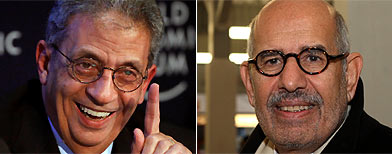
Even before President Hosni Mubarak left office on Friday, a number of hats were already in the ring to succeed him. Egypt's political future remains in flux, and it's unclear how soon the emerging contenders will get to make their bids for the now vacant presidency. So far, the Supreme Council of the Armed Forces - to which Mubarak had ceded his authority - has simply decreed that the current government ministers would continue running things until new elections are held.
It's quite possible, of course, that Mubarak appointees such as Vice President Omar Suleiman and Prime Minister Ahmed Shafik could seek the presidency. The ruling National Democratic Party is not yet dead, despite what many protesters insist. But amid the euphoria that has continued on the day after Mubarak's fall, many insist that a new era for Egyptian politics has begun, and that the fortunes of Suleiman and Shafik are waning. It may take six months to a year to organize a presidential election, analysts and party leaders say, but many predict that Mubarak's replacement will be the first Egyptian President chosen in a genuinely competitive election. (See photos of Cairo's celebration after Mubarak stepped down.)
"No one in Egypt is going to allow fraudulent and manipulated elections," says political analyst Diaa Rashwan at the Al-Ahram Center for Political and Strategic Studies. "They searched for their freedom and now they have it."
So who are the contenders for president? Taking cues from who's who among the protesters' heroes in Tahrir, you can start with the usual suspects.
At the top of the list may be Amr Moussa. State TV reported Friday that the former Egyptian foreign minister would be stepping down as Secretary General of the Arab League, where he has served for nearly a decade, renewing speculation over a presidential bid. The long-time diplomat has a large popular following in Egypt because of his habit of publicly criticizing policies of the U.S. and Israel, in marked contrast to Mubarak's quiescence. And he may be the only contender praised in a chart-topping song. Moussa made local headlines over a year ago when he demurred on the question of whether he would make a bid for the presidency, and his name has been at the tip of many tongues in Tahrir Square. "All of Egypt loves Amr Moussa," says Ali Hassan, a 21-year-old student. For Egypt's allies, Moussa may have the added appeal of being "not far from the establishment," Rashwan says. "That will be a kind of guarantee to international powers that Egyptian foreign policy will be stable." (See the 2009 discussion about an Egyptian successor.)
But there's also wildcard Mohamed ElBaradei, the nobel laureate and former head of the International Atomic Energy Agency, who captivated Egyptian and foreign media with his return to Egypt early last year to mount a fresh challenge Mubarak's dictatorship and abuses. ElBaradei commands a loyal youth following and launched the National Coalition for Change, the first broadly based campaign calling for constitutional amendments and an end to the regime. His followers have campaigned hard to promote him as a possible presidential candidate, despite ElBaradei's evasiveness on the subject. But his forays into the protest movement have been limited; the bespectacled reformist tending to tweet his dissent more often than physically acting it out. And many Egyptians still say they don't trust a man who spent much of his career abroad to make the call. "ElBaradei has lost credibility," says opposition politician Hamdeen Sabahi. "He is not really connected to the country and its people." Others have gone so far as to accuse ElBaradei of trying to hijack the revolution.
For some, the imperfect opposition leader they know - such as Ayman Nour, who ran against Mubarak in 2005 in the first multi-candidate presidential race and was subsequently jailed by the regime, slandered by state media, and stripped of his license to practice law - is a safer choice than the one they don't know. "The difference between Ayman Nour and ElBaradei is that one is a real Egyptian and the other is more of a khawaga [foreigner]," says Abdel Hamid Osman, a demonstrator. Nour commands a small army of loyal young followers, and has vowed to run in the 2011 race. On Saturday, he passed out copies of his personal draft for the new constitution. "Of course yes," Nour says of when asked if he intends to run. (See what was going through the mind of Mubarak when he was in power.)
And then there are the lesser known figures that have emerged in the course of Egypt's momentous 18 days. Yahya al-Jamal, a retired head of the constitutional court may be too old some say, but others want him to lead the way to constitutional reform. "He's the spokesman for the revolution," cried one bystander excitedly, as Jamal moved through the crowd in Tahrir last week. Other prominent judges, Mahmoued al-Khudairy and Zakaria Abdel Aziz, have also attracted attention for their time spent in the square. And another popular nobel laureate, the chemist Ahmed Zuweil has also returned to his home country to join the cause.
"We have the traditional names," says Rashwan. "But perhaps we will have dozens of new people running. The process of destroying the old regime is already finished." Now, it's time for phase two, he adds: "Building a new regime. And I'm not excluding the chance of dark horses appearing suddenly."
With reporting by Aryn Baker and Yasmine El Rashidi / Cairo
http://news.yahoo.com/s/time/20110212/wl_time/08599204878900
No comments:
Post a Comment